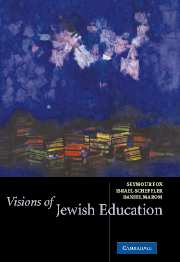Book contents
- Frontmatter
- Contents
- Preface and Acknowledgments
- About the Mandel Foundation
- Introduction
- Part I The Visions Project
- Part II Visions in Detail
- Introduction
- 4 What Must a Jew Study – and Why?
- Supplement: Isadore Twersky
- 5 Jewish Studies in Israel from a Liberal-Secular Perspective
- Supplement: Menachem Brinker
- 6 We Were as Those Who Dream: An Agenda for an Ideal Jewish Education
- Supplement: Moshe Greenberg
- 7 Reflections on the Educated Jew from the Perspective of Reform Judaism
- Supplement: Michael A. Meyer
- 8 Educated Jews: Common Elements
- Supplement: Michael Rosenak
- 9 The Concept of the Educated Person: With Some Applications to Jewish Education
- Supplement: Israel Scheffler
- Part III Visions in Context
- Conclusion: The Courage to Envision
- The Visions Project: Participants and Forums
- Index
Supplement: Michael Rosenak
Published online by Cambridge University Press: 08 January 2010
- Frontmatter
- Contents
- Preface and Acknowledgments
- About the Mandel Foundation
- Introduction
- Part I The Visions Project
- Part II Visions in Detail
- Introduction
- 4 What Must a Jew Study – and Why?
- Supplement: Isadore Twersky
- 5 Jewish Studies in Israel from a Liberal-Secular Perspective
- Supplement: Menachem Brinker
- 6 We Were as Those Who Dream: An Agenda for an Ideal Jewish Education
- Supplement: Moshe Greenberg
- 7 Reflections on the Educated Jew from the Perspective of Reform Judaism
- Supplement: Michael A. Meyer
- 8 Educated Jews: Common Elements
- Supplement: Michael Rosenak
- 9 The Concept of the Educated Person: With Some Applications to Jewish Education
- Supplement: Israel Scheffler
- Part III Visions in Context
- Conclusion: The Courage to Envision
- The Visions Project: Participants and Forums
- Index
Summary
Michael Rosenak's writing, teaching, and curricula have influenced Jewish education in the Modern Orthodox community and beyond. Rosenak has persistently searched for a language and approach that would make it possible for Jews of different ideologies to recognize that they are one community.
In our project, he asked the other scholars to consider these questions: How do conceptions of Jewish education prepare learners to respect and cooperate with Jews whose education differs from theirs? What are the characteristics that any vision of Jewish education must seek to cultivate in students that will enable them to live with Jews who have different ideological commitments? Can there be a vision for Jewish education that is acceptable to various groups within the community? Are there elements common to all conceptions of Jewish education? How could educators, community leaders, and rabbis of different denominations be guided by these common elements in such areas as curriculum and pedagogy?
For some of the educators, these questions were profoundly troubling, highlighting their fear that the commitment of all Jews to the value of Jewish peoplehood was dwindling. For others, the opportunity to explore pluralism in Jewish life was inspiring. Often the discourse among Jewish groups becomes politicized or devolves into a “conversation among the deaf.” Rosenak's contribution offered a fresh perspective. In response, many participants were more willing to try harder to accommodate one another than they would have thought.
Some educators focused on the prospect of a shared “Jewish civics” curriculum for all Jewish schools.
- Type
- Chapter
- Information
- Visions of Jewish Education , pp. 201 - 218Publisher: Cambridge University PressPrint publication year: 2003



